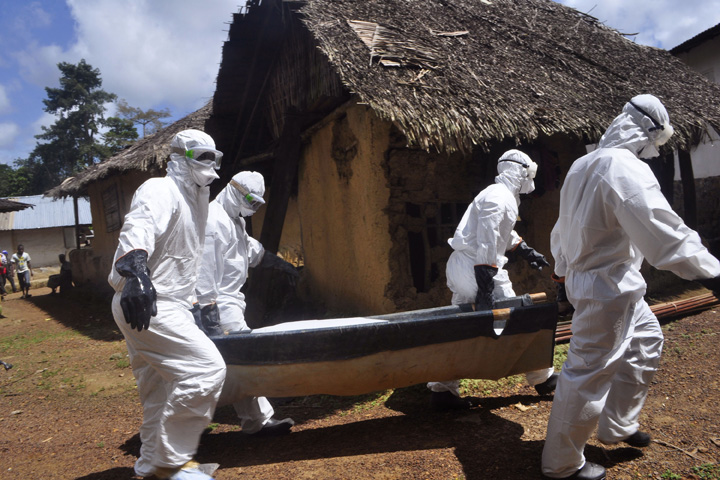Advertisement
The Country At The Epicenter Of The Ebola Outbreak
ResumeWe’ll go to Liberia, and hear from a pastor and a physician at the epicenter of the Ebola crisis.

Maybe, maybe we are getting on top of our tiny Ebola outbreak in the United States. One sick arrival and two nurses. But in West Africa, where this worst of all Ebola outbreaks took off, the outlook is still shockingly daunting. Heading for 5,000 dead. Or maybe 12,000. By the beginning of December, the region could see 10,000 new cases a week. Will need 19,000 doctors, nurses, paramedics. In Liberia, Sierra Leone, Guinea – they’re not there. This hour On Point: We go to Ebola’s epicenter in West Africa to assess the spread.
-- Tom Ashbrook
Guests
Rev. Herman Browne, dean of Trinity Cathedral in Monrovia, Liberia.
Sheri Fink, correspondent for the New York Times in Liberia. Author of "Five Days at Memorial" and "War Hospital." (@sherifink)
Dr. Nahid Bhadelia, infectious disease physician at the Boston Medical Center. Director of Infection Control at the Boston University National Emerging Infectious Diseases Laboratories.
Helene Gayle, President and CEO of CARE USA, a humanitarian organization in Sierra Leone and Liberia.
From Tom's Reading List
NPR News: Ebola In a A Church: A Reverend's Quarantine Spreads The Word — "One of the reasons Ebola continues to spread in Liberia is that people who know they've been exposed to the virus often keep it a secret until they're desperately ill and highly contagious. They fear the embarrassment, the stigma and the prospect of losing their income.But the Brownes went public."
BBC News: Liberia's Ellen Johnson Sirleaf urges world help on Ebola — "The latest crisis in West Africa is the worst-ever Ebola outbreak.The virus spreads between humans by direct contact with infected blood, bodily fluids or organs, or indirectly through contact with contaminated environments.Donors have given almost $400m to UN agencies and aid organisations, short of the $988m requested."
New York Times: In Layers of Gear, Offering Healing Hand to Ebola Patients in Liberia — "Much of West Africa is following a no-hands rule to avoid contagion from the deadly virus, but doctors and nurses here, protected by layers of plastic and rubber armor, routinely touch the sick. Without a drug that can cure the disease, they offer patients fluids and medications to treat symptoms, but also the simplest of comforts, like feeding them or cleaning them up. They follow their instincts — Dr. Hatch turned out to be right that an elderly man suffered from a chronic illness, not Ebola, as a delayed blood test result finally proved — but try to restrain their impulses, because old habits might not be safe."
This program aired on October 22, 2014.